Graduate Student Teaching Assistants

Gabriela Nagle Alverio is a J.D. – Ph.D. candidate in the University Program in Environmental Policy (UPEP) with a concentration in Political Science. Her research interests broadly include the impacts of climate change on human rights and the legal and policy solutions therein. Her dissertation research focuses on climate-induced migration. She holds a B.A. in International Relations, a B.A. in Feminist, Gender, and Sexuality Studies, and an M.A. in Environmental Communications from Stanford University.
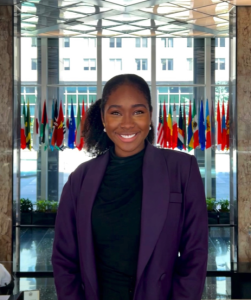
B. Eni Owoeye is a first-generation Nigerian-American and second year MPP student in the Sanford School of Public Policy. She graduated from New York University with a dual degree in International Relations and Environmental Science with a minor in Spanish and Portuguese. Eni gained work experience at the United Nations Foundation, the National Oceanic and Atmospheric Administration, and the Department of State among other nonprofit organizations. Eni enjoys working on ocean-climate-related issues and used her research in the shipping industry to further expand her repertoire of environmental issues while capturing concerns such as public health and labor rights. She also served as the co-chair for the first cohort of the U.S. Youth Advisory Council to the U.N. Ocean Decade.
Student Participants
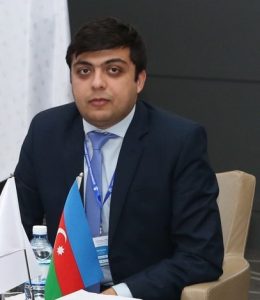
Azar Hasanli is a Master of Public Policy student at Duke University’s Sanford School of Public Policy. He holds a bachelor’s and master’s degree in international economics from the Azerbaijan State University of Economics. He is the recipient of the 2023-2025 Fulbright Scholarship and winner of the 2024 Muskie Professional Development Program, both funded by the U.S. Department of State. Azar served as an advisor at the Center for Strategic Studies under the President of the Republic of Azerbaijan, where he provided policy analyses on macroeconomic policies and global economic developments to senior government agencies. Additionally, he worked as a policy analyst at the Financial Monitoring Service of Azerbaijan, a national AML/CFT agency, contributing to the planning, implementing, and monitoring of nationwide AML/CFT reforms and projects from 2020 to 2023.
His academic and policy interests include international monetary economics, economic diversification, energy, and structural transformation. He is especially focused on understanding the impact of global energy transition on resource-rich countries and navigating these risks in light of structural economic transformation challenges in these countries. He is also interested in exploring global climate finance challenges and potential solutions to mobilize and allocate resources effectively across different country groups.
 Dmytro (Dima) Zlenko is a third-year MEM/MBA student at the Nicholas School of the Environment and UNC Kenan-Flagler Business School. Originally from Ukraine, Dmytro holds a B.A. in Environmental Science from Vytautas Magnus University in Lithuania. His primary academic interest is guiding corporate and academic institutions through their low-carbon transitions, considering large-scale ramifications, including energy interdependence in war-affected regions. At Duke, he interned with the National Parks Conservation Association, examining how biodiversity credits can power conservation, while as an MBA intern at the Sustainable Duke Office, he contributed to establishing a climate and sustainability applied learning program in support of Duke Climate Commitment. Besides English and native Ukrainian, Dmytro speaks Spanish, Polish, and Russian. He is the current president of the UNC Kenan-Flagler Net Impact Chapter, and in his free time, he likes to kayak around numerous scenic lakes and rivers in North Carolina.
Dmytro (Dima) Zlenko is a third-year MEM/MBA student at the Nicholas School of the Environment and UNC Kenan-Flagler Business School. Originally from Ukraine, Dmytro holds a B.A. in Environmental Science from Vytautas Magnus University in Lithuania. His primary academic interest is guiding corporate and academic institutions through their low-carbon transitions, considering large-scale ramifications, including energy interdependence in war-affected regions. At Duke, he interned with the National Parks Conservation Association, examining how biodiversity credits can power conservation, while as an MBA intern at the Sustainable Duke Office, he contributed to establishing a climate and sustainability applied learning program in support of Duke Climate Commitment. Besides English and native Ukrainian, Dmytro speaks Spanish, Polish, and Russian. He is the current president of the UNC Kenan-Flagler Net Impact Chapter, and in his free time, he likes to kayak around numerous scenic lakes and rivers in North Carolina.
 Felicia Wang is a senior undergraduate mathematics major, but more importantly, she loves listening to others’ stories as a community organizer and coalition facilitator. In addition to building trust and relationships, she works on state-level energy policy as the Community Outreach Assistant at NC WARN, Partnerships Lead at Sunrise Durham, and former Let’s Work Together Team Lead of the People Power North Carolina coalition. She has previously worked at Change the Chamber, where she lobbied for stronger soot regulations, as well as Conservation x Labs, where she worked on AI wildlife tracking technology. At Duke, she loves advising underclassmen on climate action as a two-time orientation Project Director (Project Earth) and former Green Devil intern at the Office of Climate and Sustainability. Her favorite parts of climate activism are connecting people across the movement, studying what it means to build people power, and building that power.
Felicia Wang is a senior undergraduate mathematics major, but more importantly, she loves listening to others’ stories as a community organizer and coalition facilitator. In addition to building trust and relationships, she works on state-level energy policy as the Community Outreach Assistant at NC WARN, Partnerships Lead at Sunrise Durham, and former Let’s Work Together Team Lead of the People Power North Carolina coalition. She has previously worked at Change the Chamber, where she lobbied for stronger soot regulations, as well as Conservation x Labs, where she worked on AI wildlife tracking technology. At Duke, she loves advising underclassmen on climate action as a two-time orientation Project Director (Project Earth) and former Green Devil intern at the Office of Climate and Sustainability. Her favorite parts of climate activism are connecting people across the movement, studying what it means to build people power, and building that power.

Gary Alvarez Mejia is a second-year Master of Public Policy student at Duke University’s Sanford School of Public Policy, concentrating in Energy and Environmental Policy. Originally from Bolivia, Gary holds a Bachelor’s degree in International Relations from Nur University (Santa Cruz, Bolivia). In his hometown Santa Cruz, Gary researched the climate action agenda of social movements in Bolivia, and how it compares to state-led climate action. He taught undergraduate courses in International Relations such as Civil Society, and Globalization of World Politics.
In 2022, Gary was awarded the Fulbright scholarship by the US Department of State to pursue graduate studies in the US from 2023 to 2025. As a professional, Gary is committed to promoting economic development through a rapid and equitable energy transition, especially in developing economies where capital is scarce. He’s also interested in the economics of the energy transition, and natural resource governance. In his free time, Gary enjoys exploring new cuisines and reading.
 Karimah Preston is a first-year Master of Engineering student in Climate and Sustainability Engineering at Duke. Originally from Chicago, she received her bachelor’s degree from North Carolina A&T State University in Biological Engineering in 2022. During her summers as an undergraduate, she interned with the USDA NRCS Arizona as a civil engineering intern, focusing on irrigation efficiencies in rural areas. She also participated in undergraduate research on microbial carbon capture and utilization. Since graduating, she has been working as a design engineer, in the development of utility-scale solar sites around the United States. Her academic interest is centered around urban sustainability and the intersection of engineering solutions to improve the quality of life for vulnerable communities.
Karimah Preston is a first-year Master of Engineering student in Climate and Sustainability Engineering at Duke. Originally from Chicago, she received her bachelor’s degree from North Carolina A&T State University in Biological Engineering in 2022. During her summers as an undergraduate, she interned with the USDA NRCS Arizona as a civil engineering intern, focusing on irrigation efficiencies in rural areas. She also participated in undergraduate research on microbial carbon capture and utilization. Since graduating, she has been working as a design engineer, in the development of utility-scale solar sites around the United States. Her academic interest is centered around urban sustainability and the intersection of engineering solutions to improve the quality of life for vulnerable communities.
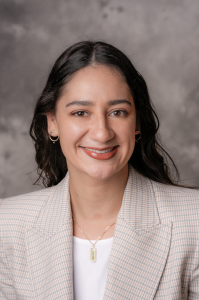 Kayla Fericy is a third-year PhD candidate in Civil and Environmental Engineering with a focus on environmental health at Duke University’s Pratt School of Engineering. Her research centers on developing technology, mapping tools, and prediction algorithms to track drinking water contamination, with an emphasis on global health. She holds a Bachelor of Science in Civil and Environmental Engineering from Rowan University, along with minors in International Studies, Spanish Studies, and Sustainable Built Environments. Kayla is passionate about bridging the gap between academia and local community initiatives to promote citizen science. In addition to her research, she has served as the site coordinator for DukeEngage in Kaihura, Uganda, the international lead for the Engineers Without Borders student chapter, and is currently the Region 7 Graduate Representative for the Society of Hispanic Professional Engineers.
Kayla Fericy is a third-year PhD candidate in Civil and Environmental Engineering with a focus on environmental health at Duke University’s Pratt School of Engineering. Her research centers on developing technology, mapping tools, and prediction algorithms to track drinking water contamination, with an emphasis on global health. She holds a Bachelor of Science in Civil and Environmental Engineering from Rowan University, along with minors in International Studies, Spanish Studies, and Sustainable Built Environments. Kayla is passionate about bridging the gap between academia and local community initiatives to promote citizen science. In addition to her research, she has served as the site coordinator for DukeEngage in Kaihura, Uganda, the international lead for the Engineers Without Borders student chapter, and is currently the Region 7 Graduate Representative for the Society of Hispanic Professional Engineers.
 Lu Liu is a Master of Public Policy student at the Sanford School of Public Policy, with a concentration in Energy and Environment. Originally from Shenzhen, a coastal city in China, she earned her Bachelor’s degree in Translation for Diplomatic Purposes from Beijing Foreign Studies University. Lu’s primary interests lie in carbon reduction and energy transition. In 2023, Lu conducted research on ocean blue carbon and carbon-inclusive mechanisms, using Shenzhen as a case study to explore the establishment of blue ocean projects through collaboration between government, businesses, research institutions, and individuals. In 2022, she worked for an internet company, where she played a key role in fostering cooperation with local government on environmental protection initiatives. She also conducted a competitor analysis of carbon inclusion applets and apps, leading to the development and successful launch of the “Green Ganjiang” applet, which gained over 4,600 registered users within its first month. Lu has earned the Certificate in ESG Investing from the CFA Institute and is eager to further explore the fields of carbon reduction and energy transition.
Lu Liu is a Master of Public Policy student at the Sanford School of Public Policy, with a concentration in Energy and Environment. Originally from Shenzhen, a coastal city in China, she earned her Bachelor’s degree in Translation for Diplomatic Purposes from Beijing Foreign Studies University. Lu’s primary interests lie in carbon reduction and energy transition. In 2023, Lu conducted research on ocean blue carbon and carbon-inclusive mechanisms, using Shenzhen as a case study to explore the establishment of blue ocean projects through collaboration between government, businesses, research institutions, and individuals. In 2022, she worked for an internet company, where she played a key role in fostering cooperation with local government on environmental protection initiatives. She also conducted a competitor analysis of carbon inclusion applets and apps, leading to the development and successful launch of the “Green Ganjiang” applet, which gained over 4,600 registered users within its first month. Lu has earned the Certificate in ESG Investing from the CFA Institute and is eager to further explore the fields of carbon reduction and energy transition.
 Livia Hoxha is a Master of International Development Policy graduate student at Duke University’s Sanford School of Public Policy, specializing in Environmental and Energy Policy Management. She is an MIP Fellow, having received the prestigious full grant from the Albanian-American Development Foundation (AADF). She holds a Bachelor’s degree in Finance and an MBA, both from the University of New York Tirana, where she was the Valedictorian and the Best Student of her generation. Her professional experiences include working as a Short-Term Consultant for Veolia Services Bulgaria, conducting market research and feasibility studies, and interning at the Ministry of Infrastructure and Energy in Albania. Livia has also served as an expert at the Ministry of Finance and Economy of Albania, where she contributed to projects related to public debt and foreign aid coordination. Fluent in six languages, Livia’s interests focus on public-private partnerships, sustainable infrastructure development, and climate change adaptation.
Livia Hoxha is a Master of International Development Policy graduate student at Duke University’s Sanford School of Public Policy, specializing in Environmental and Energy Policy Management. She is an MIP Fellow, having received the prestigious full grant from the Albanian-American Development Foundation (AADF). She holds a Bachelor’s degree in Finance and an MBA, both from the University of New York Tirana, where she was the Valedictorian and the Best Student of her generation. Her professional experiences include working as a Short-Term Consultant for Veolia Services Bulgaria, conducting market research and feasibility studies, and interning at the Ministry of Infrastructure and Energy in Albania. Livia has also served as an expert at the Ministry of Finance and Economy of Albania, where she contributed to projects related to public debt and foreign aid coordination. Fluent in six languages, Livia’s interests focus on public-private partnerships, sustainable infrastructure development, and climate change adaptation.
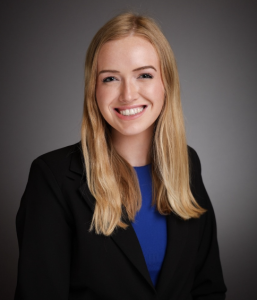 Rachel Weaver is a Master of Environmental Management student concentrating in Environmental Economics and Policy and in Terrestrial and Freshwater Ecosystems. At Duke, she is a Graduate Research Assistant and served as a member of the Core Secretariat for the 3rd International Conference on Environmental Peacebuilding in The Hague, Netherlands. She also serves as a Science and Policy Editor for the Duke Environmental Law and Policy Forum. Rachel holds dual Bachelor of Science degrees in Fisheries, Wildlife, and Conservation Biology and in Environmental Sciences from North Carolina State University. Additionally, she earned a certificate in Renewable Energy Innovation and Sustainability from Reykjavik University. Previously, she was a 2024 Stanback Presidential Fellow for the Rachel Carson Council, a Research Assistant at North Carolina State University, and a 2022 Directorate Fellow for the U.S. Fish and Wildlife Service’s Combating Wildlife Trafficking team.
Rachel Weaver is a Master of Environmental Management student concentrating in Environmental Economics and Policy and in Terrestrial and Freshwater Ecosystems. At Duke, she is a Graduate Research Assistant and served as a member of the Core Secretariat for the 3rd International Conference on Environmental Peacebuilding in The Hague, Netherlands. She also serves as a Science and Policy Editor for the Duke Environmental Law and Policy Forum. Rachel holds dual Bachelor of Science degrees in Fisheries, Wildlife, and Conservation Biology and in Environmental Sciences from North Carolina State University. Additionally, she earned a certificate in Renewable Energy Innovation and Sustainability from Reykjavik University. Previously, she was a 2024 Stanback Presidential Fellow for the Rachel Carson Council, a Research Assistant at North Carolina State University, and a 2022 Directorate Fellow for the U.S. Fish and Wildlife Service’s Combating Wildlife Trafficking team.
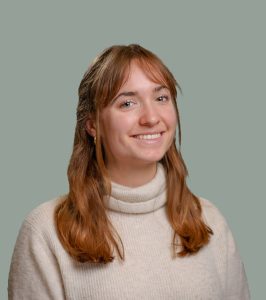
Sadie Tetreault is a second-year MEM/MBA student at the Nicholas School of the Environment and the Fuqua School of Business. She completed her undergraduate studies at George Washington University, majoring in Economics with minors in Physics and Sustainability. At Duke, Sadie is pursuing concentrations in Energy & Environment and Environmental Economics & Policy. She hopes to work at the intersection of policy and corporate governance to enable an emissions free economy. During Summer 2024, Sadie completed a Stanback Fellowship with the Rocky Mountain Institute and performed research on emerging global carbon market policies. Her research paid particular attention to the intersections between voluntary carbon market policies and compliance carbon market policies. At COP 29, Sadie is hoping to dig deeper into carbon market governance by engaging with activities that relate to Article 6 of the Paris Agreement.
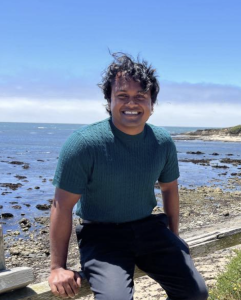
Sameer Swarup is a first year Masters of Environmental Management student at the Nicholas School of the Environment. Born in Maldives but raised in Singapore, he graduated from Carleton College with a degree in Mathematics. During his time as a data scientist in San Francisco, he worked remotely with policymakers and communities in the Maldives to implement and expand their Marine Protected Area networks. He also collaborated with the Monterey Bay Aquarium in assisting them with their kelp forest restoration projects. He is passionate about capacity building and empowering community-led movements in the marine conservation space.
 Originally from Mexico, Sayra Martinez is a second-year student in the Master of International Development Policy at Duke University, interested in public finances, tax policy, investment attraction, and sustainable growth and development. She believes that there are tax policy options with the potential to promote climate mitigation or adaptation measures. Before starting her graduate studies, Sayra worked a public servant in the Mexican Tax Administration Service (addressing transfer pricing-related cases) and the Mexican Ministry of Finance (designing and implementing tax and customs policies). Recently, she completed a summer internship with the World Bank’s Business Ready Project, focusing on taxation indicators. In addition to her current studies, Sayra is a Research Assistant for the James E. Rogers Energy Access Project at Duke and an active member and treasurer of Duke University’s Sanford Latin America and Caribbean Student’s Association (SLAC).
Originally from Mexico, Sayra Martinez is a second-year student in the Master of International Development Policy at Duke University, interested in public finances, tax policy, investment attraction, and sustainable growth and development. She believes that there are tax policy options with the potential to promote climate mitigation or adaptation measures. Before starting her graduate studies, Sayra worked a public servant in the Mexican Tax Administration Service (addressing transfer pricing-related cases) and the Mexican Ministry of Finance (designing and implementing tax and customs policies). Recently, she completed a summer internship with the World Bank’s Business Ready Project, focusing on taxation indicators. In addition to her current studies, Sayra is a Research Assistant for the James E. Rogers Energy Access Project at Duke and an active member and treasurer of Duke University’s Sanford Latin America and Caribbean Student’s Association (SLAC).
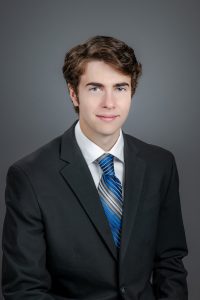
Ryan Perez is in his second year of the J.D./LL.M. in International and Comparative Law joint degree program. Ryan received his undergraduate degree from the University of Arkansas, where he double-majored in Economics and Management and minored in Philosophy. He is interested in exploring the complex legal structures and regimes surrounding energy transition. Ryan spent the first part of his summer at a law firm in Mexico City where he worked, in part, to help finance a major energy project; he spent the second half of his summer at the University of Leiden in The Hague, The Netherlands taking coursework in international law. At the law school, Ryan serves as the president of the Environmental Law Society and is in the process of starting his Substantial Research and Writing Project on the European Union’s Carbon Border Adjustment Mechanism.
 Ummamah Shah is a second-year student in the Master of Environmental Management (MEM) program at Duke University, specializing in Energy and Environment. Originally from Karachi, Pakistan, she holds an undergraduate degree in Finance. Ummamah’s career has focused on the intersection of energy and finance, including managing financing at an electricity utility, preparing energy project analyses at a bank, and conducting renewable energy investment research at an asset management firm. As a member of the World Economic Forum’s Global Shapers Community, she applies her expertise to impactful global volunteer projects, including winning the Climate Reality award for her initiative, ‘Our Trash, Our Responsibility.’ In the summer of 2024, Ummamah was selected as an EDF Climate Corps Fellow and interned as a Clean Energy Specialist with Con Edison in New York City, where she analyzed charging station data to optimize incentive structures and conducted a comprehensive study of hydrogen fuel cell vehicles. This experience further deepened her passion for advancing climate finance and clean energy solutions to address global sustainability challenges.
Ummamah Shah is a second-year student in the Master of Environmental Management (MEM) program at Duke University, specializing in Energy and Environment. Originally from Karachi, Pakistan, she holds an undergraduate degree in Finance. Ummamah’s career has focused on the intersection of energy and finance, including managing financing at an electricity utility, preparing energy project analyses at a bank, and conducting renewable energy investment research at an asset management firm. As a member of the World Economic Forum’s Global Shapers Community, she applies her expertise to impactful global volunteer projects, including winning the Climate Reality award for her initiative, ‘Our Trash, Our Responsibility.’ In the summer of 2024, Ummamah was selected as an EDF Climate Corps Fellow and interned as a Clean Energy Specialist with Con Edison in New York City, where she analyzed charging station data to optimize incentive structures and conducted a comprehensive study of hydrogen fuel cell vehicles. This experience further deepened her passion for advancing climate finance and clean energy solutions to address global sustainability challenges.

Faculty Sponsors
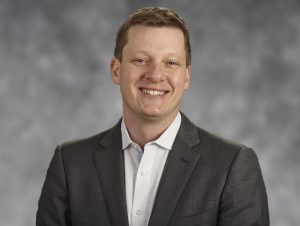 Jackson Ewing is director of energy and climate policy at the Nicholas Institute of Energy, Environment & Sustainability at Duke University. He is also an adjunct associate professor at the Nicholas School of the Environment and a faculty affiliate with the Duke Center for International Development at the Sanford School of Public Policy. He works closely with the Duke Kunshan University Environmental Research Center and International Masters of Environmental Policy programs to build policy research collaboration across Duke platforms in the United States and China.
Jackson Ewing is director of energy and climate policy at the Nicholas Institute of Energy, Environment & Sustainability at Duke University. He is also an adjunct associate professor at the Nicholas School of the Environment and a faculty affiliate with the Duke Center for International Development at the Sanford School of Public Policy. He works closely with the Duke Kunshan University Environmental Research Center and International Masters of Environmental Policy programs to build policy research collaboration across Duke platforms in the United States and China.
Prior to joining Duke, Ewing was director of Asian Sustainability at the Asia Society Policy Institute in New York, where he led projects on Asian carbon market cooperation and sustainable resource development in the ASEAN Economic Community. He previously served as a MacArthur Fellow and head of the Environment, Climate Change and Food Security Program at Singapore’s S. Rajaratnam School of International Studies, and has worked throughout Asia with actors in government, the private sector, civil society, and international organizations.
Ewing publishes widely through a range of mediums and is a regular contributor to radio, television and print media. He holds a doctorate in environmental security and master’s degree in international relations from Australia’s Bond University, and a bachelor’s degree in political science from the College of Charleston.
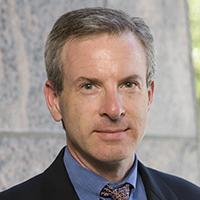 Jonathan B. Wiener is the William R. and Thomas L. Perkins Professor of Law at Duke Law School, Professor of Environmental Policy at the Nicholas School of the Environment, and Professor of Public Policy at the Sanford School of Public Policy, at Duke University. Since 2015 he is the Co-Director of the Rethinking Regulation program at Duke. From 2000-05 he was the founding Faculty Director of the Duke Center for Environmental Solutions, now expanded into the Nicholas Institute for Environmental Policy Solutions, of which he served as chair of the faculty advisory committee from 2007-10.
Jonathan B. Wiener is the William R. and Thomas L. Perkins Professor of Law at Duke Law School, Professor of Environmental Policy at the Nicholas School of the Environment, and Professor of Public Policy at the Sanford School of Public Policy, at Duke University. Since 2015 he is the Co-Director of the Rethinking Regulation program at Duke. From 2000-05 he was the founding Faculty Director of the Duke Center for Environmental Solutions, now expanded into the Nicholas Institute for Environmental Policy Solutions, of which he served as chair of the faculty advisory committee from 2007-10.
Since 2002 he has been a University Fellow of Resources for the Future (RFF), the environmental economics think tank. He is a member of the Scientific and Technical Council of the International Risk Governance Council (IRGC), and of the Chaire Economie du Climat (CEC). He was a chapter lead author for the Intergovernmental Panel on Climate Change (IPCC), 5th Assessment Report, Working Group III, Chapter 13, “International Cooperation: Agreements and Institutions” (2014). In 2015 he was a member of the Special Policy Study team on “Environmental Risk Management” for the China Council for International Cooperation on Environment and Development (CCICED). In 2014-16 he was a member of the World Economic Forum’s Global Agenda Council on Climate Change.
Before coming to Duke, he worked on U.S. and international environmental policy at the White House Council of Economic Advisers, at the White House Office of Science and Technology Policy, and at the US Department of Justice, serving in both the first Bush and Clinton administrations. He helped negotiate the Framework Convention on Climate Change, and attended the Rio Earth Summit in 1992. In 1993 he helped draft Executive Order 12866 on Regulatory Review. He received his A.B. in economics (1984) and J.D. (1987) from Harvard University.